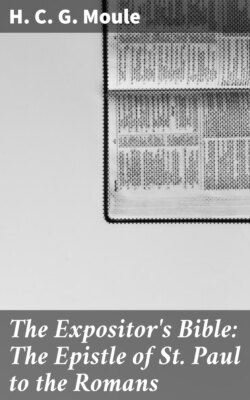Читать книгу The Expositor's Bible: The Epistle of St Paul to the Romans - H. C. G. Moule - Страница 15
На сайте Литреса книга снята с продажи.
CHAPTER IX
ОглавлениеTable of Contents
THE ONE WAY OF DIVINE ACCEPTANCE
Romans iii. 21–31
SO then "there is silence" upon earth, that man may hear the "still, small voice," "the sound of stillness" (1 Kings xix. 12),[35] from the heavens. "The Law" has spoken, with its heart-shaking thunder. It has driven in upon the soul of man, from many sides, that one fact—guilt; the eternity of the claim of righteousness, the absoluteness of the holy Will of God, and, in contrast, the failure of man, of the race, to meet that claim and do that will. It has told man, in effect, that he is "depraved,"[36] that is to say, morally distorted. He is "totally depraved," that is, the distortion has affected his whole being, so that he can supply on his own part no adequate recovering power which shall restore him to harmony with God. And the Law has nothing more to say to him, except that this condition is not only deplorable, but guilty, accountable, condemnable; and that his own conscience is the concurrent witness that it is so. He is a sinner. To be a sinner is before all things to be a transgressor of law. It is other things besides. It is to be morally diseased, and in need of surgery and medicine. It is to be morally unhappy, and an object of compassion. But first of all it is to be morally guilty, and in urgent need of justification, of a reversal of sentence, of satisfactory settlement with the offended—and eternal—Law of God.
That Law, having spoken its inexorable conditions, and having announced the just sentence of death, stands stern and silent beside the now silent offender. It has no commission to relieve his fears, to allay his grief, to pay his debts. Its awful, merciful business is to say "Thou shalt not sin," and "The wages of sin is death." It summons conscience to attention, and tells it in its now hearing ear far more than it had realized before of the horror and the doom of sin; and then it leaves conscience to take up the message and alarm the whole inner world with the certainty of guilt and judgment. So the man lies speechless before the terribly reticent Law.
Is it a merely abstract picture? Or do our hearts, the writer's and the reader's, bear any witness to its living truthfulness? God knoweth, these things are no curiosities of the past. We are not studying an interesting phase of early Christian thought. We are reading a living record of the experiences of innumerable lives which are lived on earth this day. There is such a thing indeed in our time, at this hour, as conviction of sin. There is such a thing now as a human soul, struck dumb amidst its apologies, its doubts, its denials, by the speech and then the silence of the Law of God. There is such a thing at this hour as a real man, strong and sound in thought, healthy in every faculty, used to look facts of daily life in the face, yet broken down in the indescribable conviction that he is a poor, guilty, lost sinner, and that his overwhelming need is—not now, not just now—the solution of problems of being, but the assurance that his sin is forgiven. He must be justified, or he dies. The God of the Law must somehow say He has no quarrel with him, or he dies a death which he sees, as by an intuition peculiar to conviction of sin, to be in its proper nature a death without hope, without end.
Is this "somehow" possible?
Listen, guilty and silent soul, to a sound which is audible now. In the turmoil of either secular indifference or blind self-justification you could not hear it; at best you heard a meaningless murmur. But listen now; it is articulate, and it speaks to you. The earthquake, the wind, the fire, have passed; and you are indeed awake. Now comes "the sound of stillness" in its turn.
